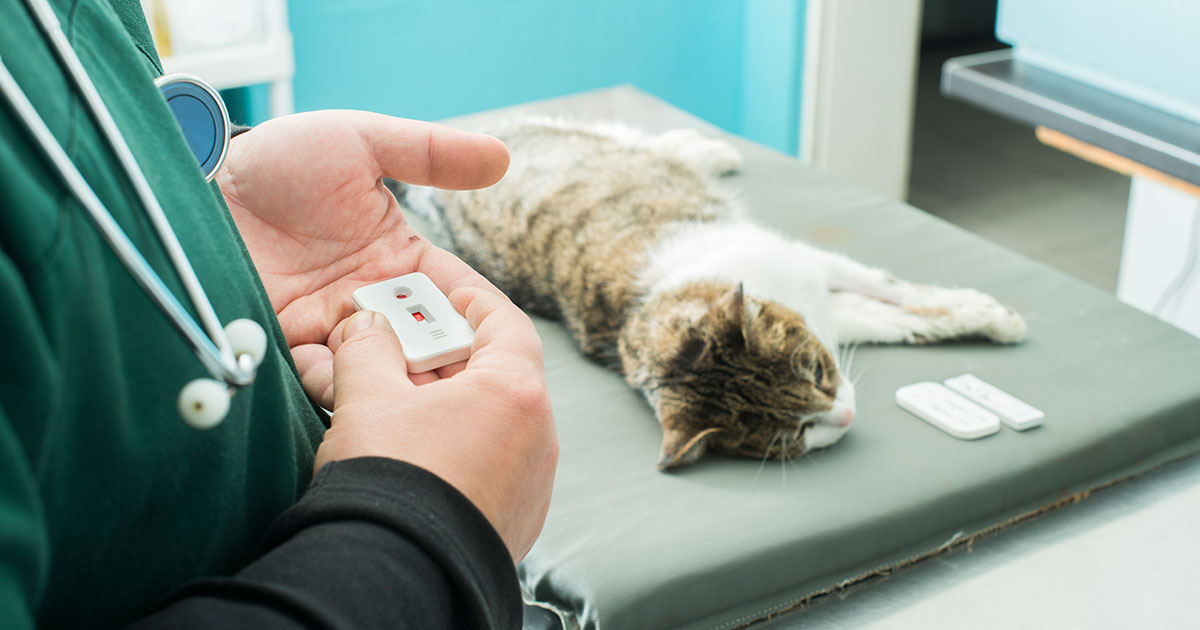 Feline asthma is a respiratory condition characterised by a cat having difficulty breathing, frequent episodes of coughing, retching and or attempted (unsuccessful) vomiting. The symptoms are triggered by environmental allergens like dust, pollen and other inhaled particles that activate the immune system. These symptoms are a result of the narrowing of airways due to inflammatory changes, as well as the thickening (hypertrophy) of muscles lining the airways and/or their constriction. Cat asthma can be acute (sudden onset) or chronic (progressive and long-term).
Feline asthma is a respiratory condition characterised by a cat having difficulty breathing, frequent episodes of coughing, retching and or attempted (unsuccessful) vomiting. The symptoms are triggered by environmental allergens like dust, pollen and other inhaled particles that activate the immune system. These symptoms are a result of the narrowing of airways due to inflammatory changes, as well as the thickening (hypertrophy) of muscles lining the airways and/or their constriction. Cat asthma can be acute (sudden onset) or chronic (progressive and long-term).
In this article, we want to shed some light on how pet owners can identify the condition in their cat households as well as the risk factors associated with asthma. We also discuss how feline asthma is diagnosed and treated and what an affected cat’s prognosis may be.
Which cats get feline asthma?
Siamese cats seem to be more prone to developing feline asthma, and will often suffer the more chronic form. However, any cat of any age can be affected by the condition. The average age range of cats diagnosed with feline asthma is two to eight years old. An individual study revealed that female cats are more affected by the condition than male cats are. Overweight and obese cats as well as cats living in environments that have airborne risk factors are also prone to suffering from feline asthma. Roughly, 1 – 5% of the cat population is afflicted by this condition.
What can aggravate feline asthma?
Some cats are more prone to feline asthma than others, but there are also environmental factors that can aggravate an already sensitive immune system and make the cat asthma worse. These include cigarette smoke, cat litter that creates dust, home diffusors, and hair sprays. An often overlooked risk factor is lung disease due to parasites. The veterinarian’s knowledge of the prevalent parasites in the area is useful in the proper diagnosis and management of feline asthma.
How long should my cat cough for before I worry about asthma?
If your cat is coughing, do not delay in taking her to the vet for an examination. Since this is usually a long-term condition that gets worse over time, experience shows that most clients bring their furry babies for a consultation when they notice the pattern and prevalence of the cough. However, if the condition is left untreated, chronic bronchitis (coughing and wheezing) can result in right-sided heart disease. It is therefore better to err on the side of caution and bring your cat in as soon as you notice any coughing – giving us the chance to assess her in the early stages of the condition.
How do I know if my cat has feline asthma?
The most commonly reported symptom of feline asthma is coughing – identified in approximately 80% of cases. Sneezing has been reported in 60% of asthma cases, while wheezing is observed in 40% of cases. Wheezing, however, is seen in more chronic forms of the condition that would have gone without treatment. Asthma can also present as difficulty breathing, characterised by forceful expiration (exhalation) that involves muscles of the abdomen and/or increased effort in breathing out. Similar to human asthma, feline asthma can be suspected whenever breathing difficulties are observed in cats.
How do vets diagnose feline asthma?
There are other respiratory conditions that cause difficulty in breathing, so the vet has to rule out infectious, parasitic and/or cardiovascular causes of breathing difficulties. It will help if you can provide the vet with an accurate history of your cat’s health – such as when you first noticed her cough or wheezing.
The vet may also perform blood tests, stool examinations, chest X-rays, urine tests, a heartworm test, FIV/FeLV test and airway sampling to evaluate of the types of cells seen. The tests help to rule out possible conditions that might cause similar respiratory signs. Most importantly, tests such as blood tests, chest X-rays and evaluation of cell types from airway samples are useful in reaching the correct diagnosis.
Is feline asthma treatable?
The good news is that feline asthma can be managed on the correct treatment. Managed is the better term, as treatment is usually instituted for life. Currently cortisone is the go-to drug for managing this condition. As always, care needs to be taken when dealing with this group of medications. Their use comes with strict instructions from the veterinarian, which need to be adhered to. Cortisone can be delivered directly to your cat’s respiratory tract via an inhaler – a method that has been proved to be safe and with good success. Bronchodilators are sometimes used in conjunction with cortisone in the management of feline asthma. However, their use is case dependent.
Lastly, nursing care is necessary in the event of an acute crisis where your cat’s breathing is significantly compromised. She will need to receive oxygen, which sometimes means being sedated to minimise movement.
What else can I do to help my asthmatic pet?
Pet owners of cats suffering from feline asthma are encouraged to ask as many questions as possible in order to get a good understanding of the condition. Being armed with accurate knowledge improves the quality of care you can give to your cat, which means a better prognosis for her.
A few nuggets for pet owners to remember:
- Learn to identify current and new risk factors in your cat’s environment. Since most causes are chronic and progressive, removing your asthmatic cat from triggering environments is warranted.
- Do not to stop therapy even when the symptoms have subsided. Stopping medication might result in the asthma getting worse in the long run, ultimately affecting other body systems such as the heart. As a rule of thumb, prompt response in the event of an acute respiratory distress incident is a must.
- Once your cat’s condition has stabilised, regularly follow up with the vet so we can monitor her condition and make adjustments to her treatment to avoid a relapse. Always let the vet know when you notice a sudden increase in symptoms, and also watch out for possible side-effects of medications. Report these to the vet asap.
What is the prognosis for my cat?
Cats suffering from feline asthma generally live long, healthy lives, as long as they are on medication and their symptoms are managed. Any changes to your cat’s environment must be taken into consideration – they can be affected by the literal air they breathe. Unfortunately, there are those unlucky few cats who have been reported to not respond to medication.


